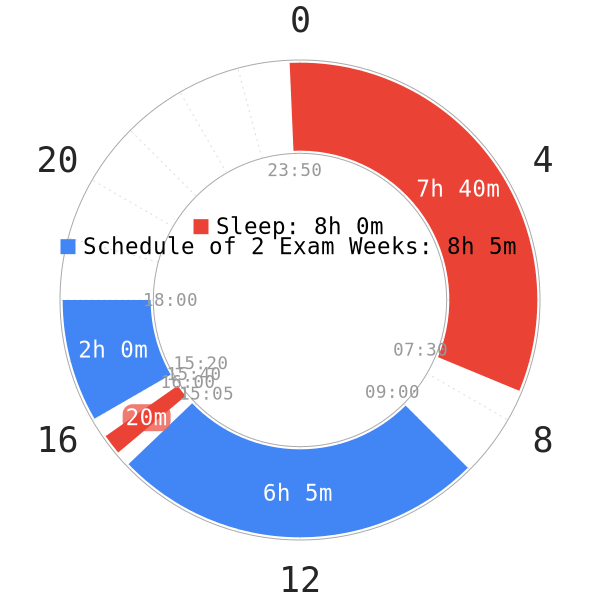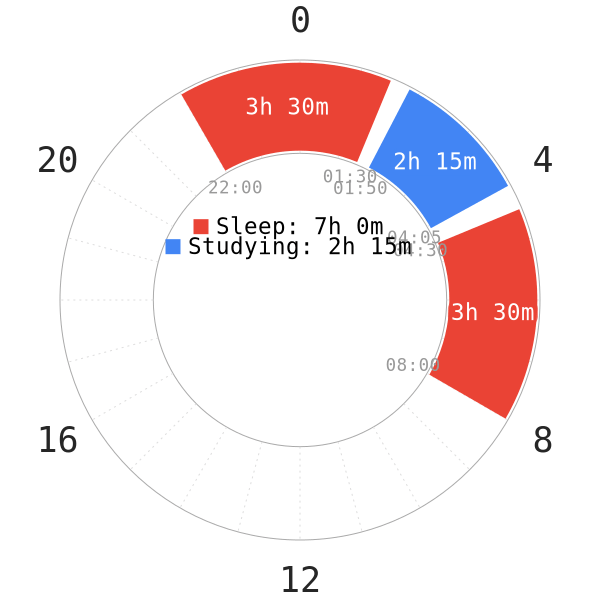Introduction
School and exams are just part of students’ lifestyle, day in day out. Even more than that, how one sleeps and prepares for exams is an entirely different story. In the community, we have witnessed many individuals who decide to take up polyphasic adaptations with incoming exams. Or, at least they ask about the viability of polyphasic sleep adaptation during these important life periods.
Since there are often concerns over exams, the question now is whether you should start a polyphasic schedule before a period full of exams. Therefore, this post will lay out the necessary guide and experience for you to consider. Succeeding in a polyphasic adaptation is in no way a given; if done willy-willy, not only your adaptation but your exam results will definitely suffer!
Preparing for a Full Examination Timeline
- Step 1: The first thing you need to do is fully map out the timeline of your exams ahead in your schedule. Is it just one exam or a series of at least 3 exams in a short timespan?
- Step 2: Assess the importance of your exam(s).
- Do you in any way have to score as high as possible?
- Is anyone putting a lot of expectations on your performance?
- How well do you think you have to perform on your exams?
- How realistic is that goal/expectation going to be?
- Step 3: Look at your personal timetable now.
- What will each day look like for you? Specifically, what hours would you dedicate to studying?
- Are there any compulsory commitments (e.g, family issues) that you need to accommodate during exam period?
- How far away are your exam(s)? Is it 1 week, 3 months or more?
- Is it possible for you to sleep at the same times everyday, considering the timing of your exam(s)?
These three steps should be sufficient for you to arrange your timetables and manage your time better before exams. You may need to add or remove any superfluous activities that you routinely do. This is because the preparation period is critical for success on exams. Furthermore, it is often more than likely that you would want to perform at your best on exam days.
Polyphasic Sleep Adaptation & Exams
Ongoing polyphasic adaptations likely will impair your memory and performance, at least for reducing schedules. To clarify, once you attempt to sleep less than your regular monophasic baseline, you may or may not feel the immediate presence of sleep deprivation symptoms. These include, but not limited to:
- Subjective fatigue (e.g, more productivity lapses, more evening tiredness)
- Slower reaction speed
- More procrastination, or trouble following through your plans. This is because you simply are not alert and motivated enough to pull through.
- Trouble memorizing and applying learned materials
The best way is to take a look at this exam scheduling example below.
Example: A Series of Exams
A student is taking 5 exams that are scheduled near one another. However, he does not have any extra commitments but studying during this 2-week period. In addition, he has approximately 3-4 weeks to prepare for these very crucial exams.
Schedule of exam week:
- Week 1: Monday (4-6 PM), Thursday (1-3 PM)
- Week 2: Monday (9-11 AM), Tuesday (9-11 AM) and Friday (11 AM-1 PM)

Solution 1
We provide you the following possible solutions. However, the final decision is still yours to make.
- Because of the significant nature of these exams, the safest bet (and for every exam ever) is to avoid reducing total sleep. Thus, you now have non-reducing biphasic schedules.

- They can be flexible during adaptation, even the naps as you ask.
- Moreover, the daytime nap gives you an extra opportunity to rest and consolidate your learned materials. Even if the nap contains only NREM2, it still gives you actual rest and benefit your learning. For the core sleep, you sleep a normal amount at night.
- The adaptation period is overall easy; you may even be a natural biphasic sleeper right now. If so, keep up that habit.
- The timing of the nap should be around 3:10-3:45ish PM, if you plan to uphold your biphasic schedule even after all exams. Alternatively, you can go a 90-minute Siesta before the exam weeks, and then temporarily drop down to 20-minute naps during this time window. This would effectively make for a Biphasic-X schedule.
- Because you are not reducing total sleep, you more than likely do not have to do a “recovery” period afterwards. This period is often present on reducing schedules with sleep deprivation involvement.
Solution 2
- You can somewhat reduce your total sleep and start a fairly straightforward adaptation.
- However, bear in mind that your adaptation may be hindered by stress, worry, concerns or possibly even schedule interruptions. This is because you now have to adhere to strict sleep times with reduced sleep duration.

- Based on the exam schedule above, Segmented sleep makes for a strong option. You can even plan your study hours between 2 core sleeps.
- Now you can avoid all the hassles of napping during the day, especially on exam days. If you are not a skilled enough napper, then it would be better to not nap at all. No daytime nap also means that you do not have to worry about any potential changes in exam times.
- Assuming that you usually sleep ~8h a day, this is 1 extra hour of wake time. As a result, it may still be beneficial for you. The adaptation to Segmented is overall not very taxing on your performance either.
- However, if you are not a naturally Segmented sleeper, you may still run into certain tough days when adapting.
- Furthermore, by the time the exams arrive, you may or may not have adapted to Segmented. Since the second core ends at 8 AM, it may be too close to one of your exams’ start time (9 AM). Be careful and set extra alarms!
Solution 3: More Radical Sleep Reduction
This is a very common trap that many polyphasic beginners fall into. They often think that they can adapt to a polyphasic schedule within the “mandatory” 3-4 week period. Apparently, reality is very different. We have seen months of struggling to adapt to a semi-difficult polyphasic schedule (e.g, Everyman 2) in some cases, let alone 3-4 weeks.
Furthermore, these sleepers (average ~7-9h monophasic sleepers) often think that more wake time would mean more productive time. It depends on the amount of sleep reduction, but any schedules that give less than 6h total sleep a day are not meant to be a cakewalk! Stage 3 of an adaptation can and will cripple a lot of productivity time, not to mention oversleeping chances.
This is not to say that it is impossible to completely cut sleep below 6h while acing your own exams. Although rare, we have seen few people perform seemingly well on restricted sleep. The most common factors seem to be dedication and motivation. Regardless, we are merely recommending a safer approach to maximize your exam performance.
Overall, the first 2 solutions seem much more viable than this third solution.
Other Notes
- If you have to consistently performing near or at your best, reconsider starting an adaptation. It would be better to wait out the hectic periods of your life.
- Even though we only provide one example, it should serve as a viable reference for any other examination period.
- If you have less than a week until your exam, focus on eating well and getting a good amount of sleep. Of course, learn to manage your time better rather than rely on more sleep reduction. If you cannot manage your current wake hours, you cannot hope to manage MORE wake hours on a reduced polyphasic schedule.
- Wait for a vacation or until the exams are over may also offer you a greater freedom in your schedule selection.
Main authors: Crimson & GeneralNguyen
Page last updated: 15 February 2021
